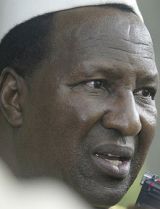African Union avoids major rift on Darfur
Jan 31, 2007 (ADDIS ABABA) — The eighth African Union summit managed to avoid splitting asunder over Sudan’s ambition to head up the body but failed to mobilise troops and funds for a long-awaited Somalia peacekeeping mission.
 As predicted beforehand, the continent’s two major troublespots — Somalia and the Sudanese region of Darfur — dominated proceedings at the two-day heads of state gathering in the Ethiopian capital which wrapped up late Tuesday.
As predicted beforehand, the continent’s two major troublespots — Somalia and the Sudanese region of Darfur — dominated proceedings at the two-day heads of state gathering in the Ethiopian capital which wrapped up late Tuesday.
Sudan suffered a double humiliation when it not only received a public dressing-down from new UN chief Ban Ki-Moon over its “terrifying” aerial bombardments of Darfur but was then snubbed in its attempt to take up the presidency of the organisation which instead went to Ghana.
Detailing what he called the “positive outcomes from this summit”, the AU commission president Alpha Oumar Konare pinpointed the consensus which formed around the idea of Ghana taking the post.
“First and foremost, there was the consensus over the choice of Ghana as the chairman, a consensus that was also supported by Sudan even though it had been a candidate itself,” Konare told AFP in a post-summit interview.
During the last summit in Khartoum, the heads of state agreed to designate Sudan’s Omar al-Beshir as the next AU president on condition that the situation improved in Darfur where a 7,000-strong AU force has been struggling to make any impact.
But with aid agencies describing the humanitarian situation in Darfur as being worse than ever and Ban holding Beshir personally responsible for bombings, negotiations on a compromise candidate were well advanced as the summit opened.
Up until Sunday night, the Sudanese delegation insisted there was “no alternative scenario” to Khartoum assuming the chairmanship. But by Monday morning, Beshir had read the writing on the wall, telling AFP that it would be “no problem” if his peers opted for someone else.
Konare sought to put a brave face on the efforts to deploy troops to Somalia after a weak transitional government recently ousted hardline Islamists from the capital Mogadishu with the help of Ethiopian soldiers.
“With Somalia, there was the reiteration of a strong commitment for the deployment of a stabilisation force, but on the express condition that the transitional government opens dialogue with all elements of Somali society,” he said.
And indeed, Somalia’s interim President Abdullahi Yusuf Ahmed did pledge at the summit to stage a national conference of reconciliation in a country where rival factions have been slugging it out for the last 16 years.
But with still only a handful of countries committing themselves to providing troops, Ghana’s President John Kufuor was forced to appeal once more for contributions as he wound up proceedings.
“We need a force of 8,000. So far we have 4,000,” said the new AU president.
“We appeal to member states to contribute and we are still expecting them to answer.”
Only the small central African country of Burundi announced during the summit that it would send troops, following earlier pledges from Ghana, Nigeria, Malawi and Uganda.
Ethiopia, keen to pull its troops out sooner rather than later, expressed hope on Wednesday that the AU force would begin its mission in two or three weeks but the issue of funding remains unresolved.
Following Yusuf’s commitment to hold the reconciliation conference, European Union commissioner Louis Michel did agree to release some 15 million euros for the force, but much more will be needed to cover the bill.
Konare deplored how the AU “always has to hold out its hand” for funds.
“We are counting too much on outside help, that’s unacceptable for me. Our member states are not assuming their responsibilities”.
(AFP)
